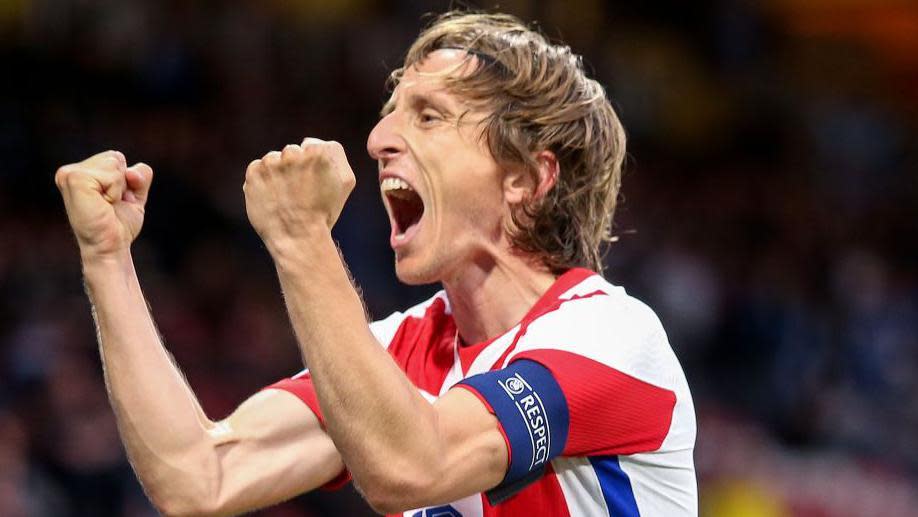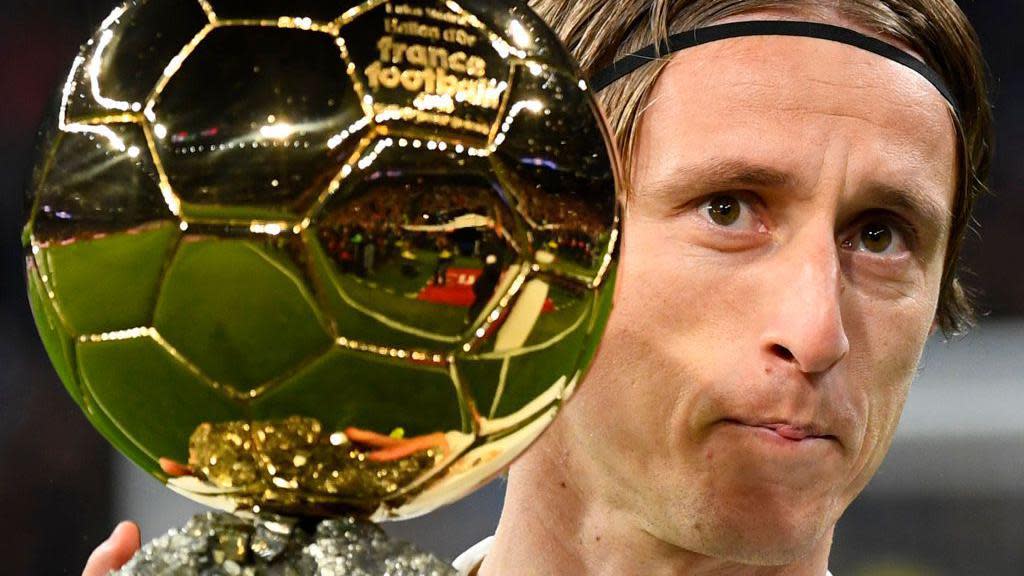From goat herding to idol - Modric's 'underdog' rise to the top

Whatever the outcome of Croatia's Euro 2024 campaign, Luka Modric has no plans on ending his illustrious career with the national side.
The 38-year-old Real Madrid midfielder still has ambitions to play another World Cup - thus adding to his record 177 appearances for his country and his already iconic status.
They go into Monday's Group B match against Italy though knowing only victory can realistically save them, with defeat bringing the inevitable speculation Modric could have played his last game for his country - no matter his intentions.
Captain since August 2016, he is an idol in Croatia, a relatively new country that idolises its sporting giants.
Modric's greatness is amplified by the fact that it has been achieved in a fashion that many believe mirrors Croatia's own climb towards independence and ultimate victory.
And what a journey it has been ... and continues to be.

'Modric should run for president'
It is difficult to find the words to explain the esteem in which he is held throughout Croatia and in particular in Zadar, the city of his childhood.
On a recent trip to this unspoilt calm resort on the Dalmatian coast, one resident of the city told me: "Modric should run for president.
"No one else would even get close. We will not have one like him for another 100 years."
Modric's journey to the top has been rockier and more demanding than the slopes of the Velebit mountain in the tiny hamlet of Modrici near Zadar, where, as a five-year-old, the young Luka used to herd his grandfather's goats.
On terrain not suitable for agriculture, never mind football matches, he would while away the hours with a ball, hitting it towards the entry of the garage in the solitary house that he shared with his family and grandparents.
Just 10 metres from that garage door, his grandad was killed after the start of the war for independence in Croatia.
It was from this background that this pencil-thin, frail looking boy would rise to triumph against adversity to become not just one of his country's most emblematic legends, but also one of the greatest footballers of his generation.
When the Croatian war of independence broke out, his family were forced to flee after his grandfather was executed by Serbian rebels and their home was burned to the ground.
The next seven years saw him live with his family as refugees in hotels in Zadar, where, alongside other children, the young Luka would use football, played in semi-organised matches on the hotel parking lots, as a means of escaping the harsh realities of war.
He would say later that whenever he looked back at pictures taken of himself at that time, he realised he was never pictured without a ball.
School and then admission to the local Zadar academy followed before he was signed by Dinamo Zagreb's academy as a 16-year-old.
Today Croatia is replete with coaches, mentors and teachers who knew him then and will form an orderly queue to tell you how his talent was there for all to see in those early days and just how much potential he had.
But nothing could be further from the truth.
The reality is that Modric was an underdog at every point of his development. Always doubted. Never perceived as a star.
'He's spent his career proving people wrong'
Dinamo Zagreb quickly sent him out on loan to Zrinjski Mostar in the Bosnian League, where the only guarantee he had was that he was going to have lumps kicked out of him on a daily basis.
Today they will tell you that they sent him there to develop him as a player, toughen him up - but there were also doubts whether he was strong enough or good enough.
Modric has spent most of his career proving people wrong.
When a 19-year-old Modric returned from his regular Bosnian kickings, he was sent straight back out on loan, this time to Croatian side Inter Zapresic.
Eventually on his return, he showed enough over a four-year spell at the club where he scored 31 goals and had 29 assists to attract the attention of a variety of clubs around Europe, including Barcelona, Arsenal and Chelsea.
By the time he left to join Spurs in the spring of 2008 he had won three Croatian League titles.
Modric signed for Tottenham for £16.5m in 2008 to become the club's then record signing but initially struggled and was regarded by many as not physically strong enough for the rigours of the Premier League.
Once again though he would prevail and Tottenham's desire to hold on the player that so many had previously referred to as 'lightweight' was to no avail when Real Madrid came calling four years later.
Another club, another battle to win.
Protracted transfer negotiations meant a missed pre-season and the presence of Xabi Alonso and Mesut Ozil in Jose Mourinho's Madrid side often saw him left out.
At the end of that first season, in a poll organised by Madrid newspaper Marca, he was voted by Real fans as the worst ever foreign signing at the club.
Mocked and derided, he used to be referred to as the guy that assists the guy who lays on the assists.
Mourinho was one of the first to spot his ability to shake up the play from his first touch and prevent teams like Barcelona from dominating with their high press. People soon realised he was the antidote to the high pressing, swift-regaining-of-possession game much loved by Barcelona.
From this moment on his status grew at the club.
Now, after winning 26 trophies including four La Liga titles and six Champions Leagues, he has faced and won another battle, another challenge at Real.
As he comes ever closer to the twilight of his career he has found himself used far less than in previous seasons, something manager Carlo Ancelotti had told him would happen.
He has become a decisive game changer in cameo displays in the dying embers of the most important of games.
Modric is not a good substitute. He walked the corridors of the training ground sulking for months. But he has felt important, especially in the last months of the campaign.
After Real hesitated on making a decision about his future - something they invariably do with players over 30 - they finally signed him for another year.
Despite offers on the table from the Major League Soccer and Saudi Arabia, he was desperate to stay having previously said his aim is be at the Bernabeu when he retires.
'Croatia's silent leader'

Modric has always been a central midfielder with Croatia but with the national side he has a less structured role than at club level, which allows him to express his natural flair and feeling for the game.
He has been described as the silent leader. He is not outwardly vocal and all those that play with him say his leadership comes from within.
His desire to carry on for his country is what sets him apart from his contemporaries and also explains why he enjoys iconic status.
After the 2018 World Cup in Russia, players such as Mario Mandzukic, Danijel Subasic and Vedran Corluka decided to bring the curtain down on their international careers, preferring instead to focus on whatever playing time they still had in club football.
This was never an option for Modric.
Many believe that his influence on the game and on Croatian football is so great that he doesn't need to score goals and make assists to be the most important player on the field.
As happy as he is to talk about football he is an intensely private family man - as are his parents - all of them quiet and unassuming, and proud in the knowledge they have come through adversity without wishing to spend their time dwelling on the past, preferring instead to look to the future.
There is an elephant in the room.
In 2018, he was charged with making false statements at the tax fraud trial of Zdravko Mamic, a former executive director at Dinamo Zagreb, including the deal that took Modric to Tottenham in 2008.
A Croatian court lifted those charges on the eve of the 2018 World Cup, where Croatia lost in the final to France. Modric won Fifa's Golden Ball as the best player at the tournament.
The story still hurts Modric and his family. He survived the scandal though.
Throughout his career, Modric has given his country identity and in the process has himself been elevated to a special status.
Croatians praise their champions as a way of setting an example to the youth but also to reinforce the feeling that their country is special, strong and unbeatable.
All that also means that nothing from the past can leave a mark on his profile in the eyes of his compatriots.
Try taking yourself back to the evening when he won the Ballon d'Or. Imagine the pride of his father upon the realisation that the best player in the world was his boy, that same kid that herded goats in the rugged mountains of Zadar.
His son, and a son of Croatia.
